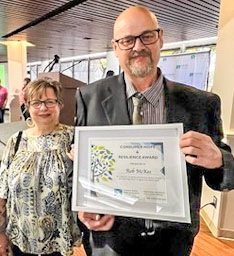Movember is the month dedicated to men’s health awareness. It involves but isn’t limited to the growing of moustaches to encourage conversations about prostate and testicular cancer as well as men’s mental health and suicide prevention.
Rob McKee is not only the recipient of the Canadian Mental Health Association (East Champlain) Hope and Resiliency Award but also a fierce advocate for men’s mental health.
McKee didn’t consider the amount of stress he was under to be excessive during his corporate career nor did he think he had any real issues to deal however looking back now he says he was a “pressure cooker just waiting to go off”. While he admits he had anger, he never experienced anything remotely close to what he referred to as a ‘tunnel of white light’ that filled him with rage one day.
His earnest account of this life changing experience and the consequences of removing himself immediately from the life he knew is sobering to say the least but it was the process of his adaptation in the face of continued adversity and significant sources of stress that speaks to his resilience.
He immediately made an appointment with his doctor and took proactive action toward wellness. Years of unresolved issues had compounded, he had to address food and alcohol addictions all while managing the fear and anxieties of another mental break. Every day he made conscious decisions to do the hard work of recovery despite continued challenges.
“Honesty is key,” he said about the path to a healthier mental state You can’t get better without being honest with yourself and the support system around you.
There are many factors to why men’s mental health issues go unrecognized until it’s too late. Some of these include, social norms and expectations that pressure men to be strong. Role models and upbringing that teach men to cope with problems by themselves or use unhealthy coping behaviours. There can also be shame or embarrassment about seeking help for mental health issues.
McKee pushed past all of those barriers and credits much of his way through the darkness to his support system, his partner, the team at CMHA, his doctor and a weekly men’s support group, Mentalk/K homme’unique Groupe de Soutien pour Hommes.
Mentalk was a lifeline for him, he says they’re not always talking about the difficulties they’re talking about every day life, checking on each other, holding each other accountable. “I couldn’t have made it through without them.”
His advice for dealing with aggression or depression is to just start talking to someone. Talk to your doctor, talk to other men who understand and if you’re not ready for that then journal it, get the words out.
3 out of 4 suicides in Canada are men. The issue of suicide is incredibly complex but we do know this, improving overall mental health and helping men establish better social connections can reduce the risk of suicide.
For more information or if you’re in crisis call the Mental Health Helpline at 1-866-531-2600 or find your local CMHA branch.



